(完整word版)英语中副词及用法
(完整word版)英语语法知识大全
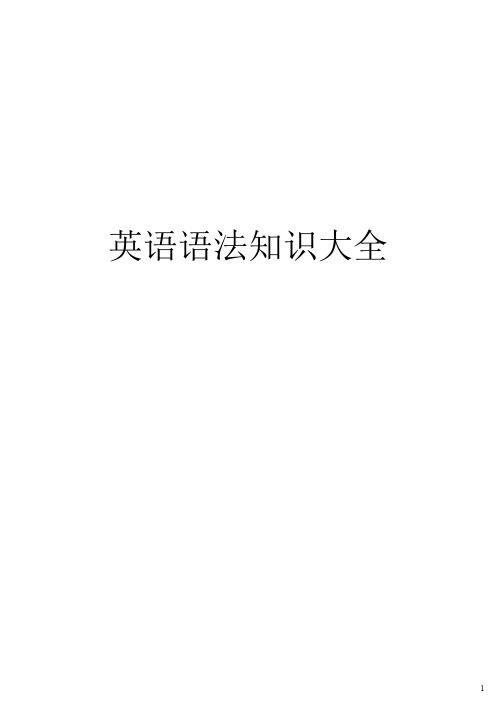
英语语法知识大全词类、句子成分和构词法一、词类:英语词类分十种:名词、形容词、代词、数词、冠词、动词、副词、介词、连词、感叹词。
1、名词(n.):表示人、事物、地点或抽象概念的名称。
如:boy morning bag ball class orange(橙).2、代词(pron.):主要用来代替名词。
如:who she you it3、形容词(adj..):表示人或事物的性质或特征,用来修饰名词。
如:good right white(白色)orange(橙色).4、数词(num.):表示数目或事物的顺序。
如:one two three first(第一)second(第二)third(第三)fourth(第四).5、动词(v.):表示动作或状态。
如:am is are have(有)see(见)6、副词(adv.):修饰动词、形容词或其他副词,说明时间、地点、程度等。
如:now(现在)very(很)here(在这里)often(经常)quietly(平静)slowly(慢慢地)7、冠词(art..):用在名词前,帮助说明名词,说明名词所指的人或物的词。
如:a an the8、介词(prep.):表示它后面的名词或代词与其他句子成分的关系。
如:in on from(来自)above(在…上面)behind(在…之后)9、连词(conj.):用来连接词、短语或句子。
如and but before10、感叹词(interj..)表示喜、怒、哀、乐等感情。
如:oh well hi hello二、句子成分:英语句子成分分为七种:主语、谓语、宾语、定语、状语、表语、宾语补足语。
1、主语是句子所要说的人或事物,回答是“谁”或者“什么”。
通常用名词或代词担任。
如:I’m Miss Green.(我是格林小姐)2、谓语动词说明主语的动作或状态,回答“做(什么)”。
主要由动词担任。
如:Jack cleans the room every day. (杰克每天打扫房间)3、表语在系动词之后,说明主语的身份或特征,回答是“什么”或者“怎么样”。
副词的分类及用法Word版

副词的分类及用法一、时间副词1.常见的时间副词常见的时间副词有now(现在;立刻;目前;马上;其时;当时) then(当时;那时;接着;于是;然后;还有;而且;那么;因此) soon(不久;即刻;马上;宁可;;宁愿) ago (以前) recently(最近;近来) lately(近来;最近;不久前) later(较晚地;后来) finally (最后;终于;完全地) before(先前;从前;以前) early(早;先;在初期;在早期) today (今天) tomorrow(明天) yesterday(昨天) tonight(今晚) suddenly(意外地;忽然;冷不防) immediately(即刻;马上;直接地) already(已经) just(刚刚)等。
2.时间副词在句中的位置(1)表确定时间的副词(如today, yesterday等)通常位于句末,有时也位于句首:He went home yesterday. / Yesterday he went home. 他昨天回家了。
而那些表示非确定时间的副词(如 soon, recently, suddenly等)除可用于句末或句首外,还可位于句中(通常位于实义动词之前,动词be、助动词、情态动词之后):He went to Paris recently. / He recently went to Paris. / Recently he went to Paris. 最近他去了巴黎。
(2) still, already, just 等几个表示时间的副词通常位于句中(实意动词之前,动词be、助动词、情态动词之后):He’s just left for school. 他刚刚去学校。
I have already finished my work. 我已经做完了工作。
当要表示强调时,still和already也可位于动词be、助动词等之前:She was still [still was] beautiful at the age of forty. 她到了40岁仍然很美。
副词详解

2. 作定语
一般放在所修饰词之后
The people here are very friendly. 这儿的人很友好。
注:①有些副词可修饰名词,用以加强语气,常用的这类
副词有,quite, even, rather. e.g she is quite a pretty
girl
②有些副词可修饰部分不定代词和数词。常用的有
(2)副词修饰动词时,一般放在被修饰词之后;very,quite
不能修饰动词;方式副词放在句尾 Kobe plays basketball very well. 科比打篮球非常好。 (3)位于句首,修饰整个句子 Luckily, he was not hurt badly. 幸运的是,他伤得不重。
• 3.程度副词(very,quite,almost,fairly, nearly,just,extremely,hardly,etc.)常放 在被修饰词之前,但当very修饰动词时,常与 much连用并置于句末。例如: I like her very much • 4.频度副词(ever,never,often,always, seldom,sometimes,etc.)常放在动词之前, 或系动词、助动词、情态动词之后。其中 sometimes也常置于句首。例如: I have never been to America.
常放在宾语之后或不及物动词之后。 例如: ①Mary speaks Chinese very well. well, fast, 方式 carefully, slowly, 玛丽的汉语说得非常好。 副词 quickly ② The monkeys ate up the bananas quickly. 猴子们飞快地吃光了香蕉。
英语副词的分类及用法
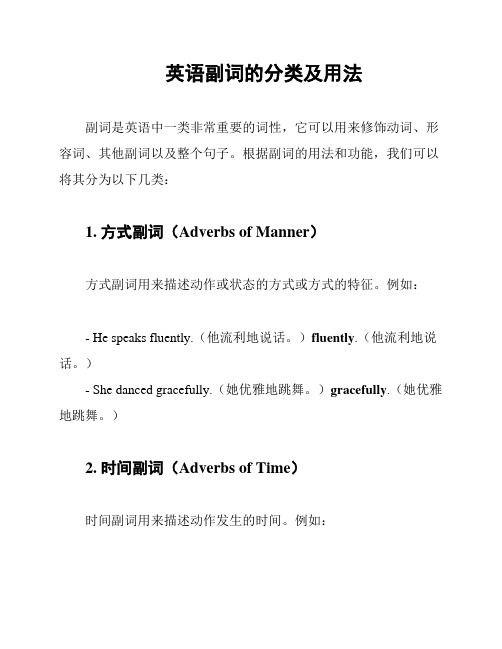
英语副词的分类及用法副词是英语中一类非常重要的词性,它可以用来修饰动词、形容词、其他副词以及整个句子。
根据副词的用法和功能,我们可以将其分为以下几类:1. 方式副词(Adverbs of Manner)方式副词用来描述动作或状态的方式或方式的特征。
例如:- He speaks fluently.(他流利地说话。
)fluently.(他流利地说话。
)- She danced gracefully.(她优雅地跳舞。
)gracefully.(她优雅地跳舞。
)2. 时间副词(Adverbs of Time)时间副词用来描述动作发生的时间。
例如:- We will meet tomorrow.(我们明天见面。
)tomorrow.(我们明天见面。
)- I always go to the gym in the morning.(我总是早上去健身房。
)in the morning.(我总是早上去健身房。
)3. 地点副词(Adverbs of Place)地点副词用来描述动作发生的地点。
例如:- The cat is sitting upstairs.(猫坐在楼上。
)upstairs.(猫坐在楼上。
)- She searched for her keys everywhere.(她到处找她的钥匙。
)everywhere.(她到处找她的钥匙。
)4. 程度副词(Adverbs of Degree)程度副词用来描述动作或状态的程度。
例如:- He runs very fast.(他跑得非常快。
)very fast.(他跑得非常快。
)- They were extremely tired after the long hike.(长时间的徒步旅行后他们非常疲惫。
)extremely tired after the long hike.(长时间的徒步旅行后他们非常疲惫。
)5. 频率副词(Adverbs of Frequency)频率副词用来描述动作发生的频率。
高考总复习-副词的种类及用法
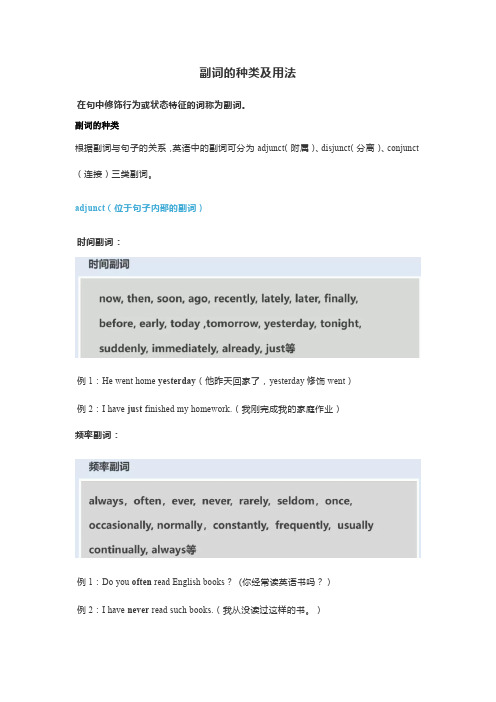
副词的种类及用法在句中修饰行为或状态特征的词称为副词。
副词的种类根据副词与句子的关系,英语中的副词可分为adjunct(附属)、disjunct(分离)、conjunct (连接)三类副词。
adjunct(位于句子内部的副词)时间副词:例1:He went home yesterday(他昨天回家了,yesterday修饰went)例2:I have just finished my homework.(我刚完成我的家庭作业)频率副词:例1:Do you often read English books?(你经常读英语书吗?)例2:I have never read such books.(我从没读过这样的书。
)地点副词:例1:He will study abroad next year(明年他将在国外学习)例2: He came in(他进来)方式副词:例1:Jack drives very carefully.(杰克开车很小心)例2:She slowly opened the present. (她慢慢地打开礼物)程度副词:例1:I am deeply grateful to you(我由衷地感激你)例2:I quite agree with your opinion(我相当同意你的观点)疑问副词:how,when,where,why例:How often do you see a movie(你多久看一次电影)关系副词:when,where,why例:This is(the place)where he was born.(这是他出生的地方)conjunct(连接两个句子的副词)连接副词:therefore(因此),moreover(此外),however,otherwise(另外的),then,when ,where,how,why……例1:We must be early; otherwise we won't get a seat(我们得早点走,否则我们就没有座位了)例2:Bicycling is good exercise; moreover, it won't pollute the air.(骑自行车是个很好的运动,此外它还不污染环境)disjunct(与句子分离的副词)句子副词(修饰整个句子):actually,certainly,clearly,definitely,evidently(明显地),fortunately,frankly,honestly,possibly,undoubtedly(的确地),unexpectedly(未料到地),finally等undoubtedly,he is an expert in this field.(毫无疑问,他是这个领域的专家)frankly, you are wrong.(坦白说你错了)副词的位置一般原则:遇有be 动词或助动词时,副词均置于该be动词或助动词之后例1:He is always kind.例2:He can hardly walk(他几乎走不动了)1. 频率副词,置于一般行为动词之前He has never been late. 他从未迟到过。
英语中副词的用法举例

英语中副词的用法举例副词是一类常见的词性,在英语语言中起着非常重要的作用。
它们通常被用来修饰动词、形容词、其他副词或整个句子,以增加句子的信息量和表达方式。
以下是一些常见的副词用法举例:1.修饰动词:–She quickly ran to catch the bus.–He carefully listened to the instructions.2.修饰形容词:–The puppy is very cute.–It was a remarkably beautiful sunset.3.修饰其他副词:–He spoke extremely fast.–She danced quite gracefully.4.修饰整个句子:–Fortunately, the rain stopped before theoutdoor event.–Interestingly, the results of the experiment were unexpected.5.副词短语:–She studies English twice a week.–They go on vacation every summer.6.程度副词:–He is very clever.–She is extremely talented.7.时间副词:–They arrived early for the meeting.–The train is always on time.8.地点副词:–She looked everywhere for her lost keys.–The children ran upstairs to get their toys.9.方式副词:–He speaks English fluently.–She completed the task successfully.副词在英语中有多种用法,通过灵活运用副词可以使语言更加生动、精确和有表现力。
英语中副词及用法规律总结
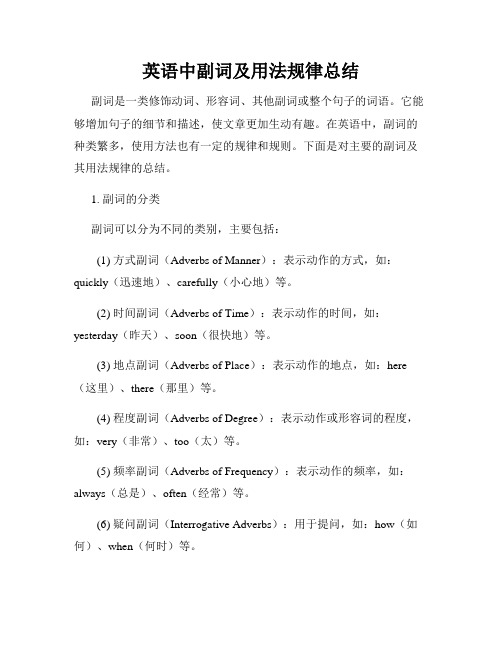
英语中副词及用法规律总结副词是一类修饰动词、形容词、其他副词或整个句子的词语。
它能够增加句子的细节和描述,使文章更加生动有趣。
在英语中,副词的种类繁多,使用方法也有一定的规律和规则。
下面是对主要的副词及其用法规律的总结。
1. 副词的分类副词可以分为不同的类别,主要包括:(1) 方式副词(Adverbs of Manner):表示动作的方式,如:quickly(迅速地)、carefully(小心地)等。
(2) 时间副词(Adverbs of Time):表示动作的时间,如:yesterday(昨天)、soon(很快地)等。
(3) 地点副词(Adverbs of Place):表示动作的地点,如:here (这里)、there(那里)等。
(4) 程度副词(Adverbs of Degree):表示动作或形容词的程度,如:very(非常)、too(太)等。
(5) 频率副词(Adverbs of Frequency):表示动作的频率,如:always(总是)、often(经常)等。
(6) 疑问副词(Interrogative Adverbs):用于提问,如:how(如何)、when(何时)等。
(7) 连接副词(Conjunctive Adverbs):用于连接句子,如:however(然而)、therefore(因此)等。
2. 副词的用法规律(1) 修饰动词:副词可以用来修饰动词,描述动作的方式、时间、地点等,如:He runs quickly(他跑得快)。
(2) 修饰形容词:副词可以用来修饰形容词,表示形容词的程度,如:It's very hot(非常热)。
(3) 修饰其他副词:副词可以用来修饰其他副词,表示程度、方式等,如:He speaks very fluently(他说得非常流利)。
(4) 修饰整个句子:副词可以用来修饰整个句子,表示说话者的观点、态度等,如:Certainly, I will help you(当然,我会帮助你)。
(完整word版)形容词和副词的比较级和最高级
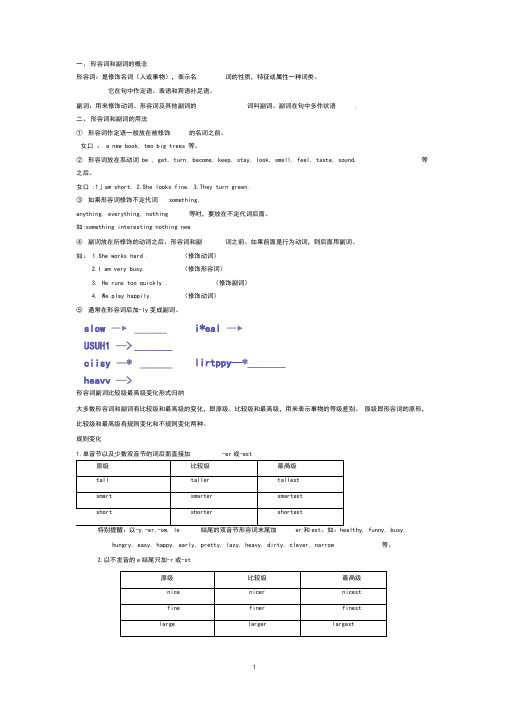
一、 形容词和副词的概念形容词:是修饰名词(人或事物),表示名词的性质,特征或属性一种词类。
它在句中作定语、表语和宾语补足语。
副词:用来修饰动词、形容词及其他副词的词叫副词。
副词在句中多作状语 . 二、 形容词和副词的用法① 形容词作定语一般放在被修饰 的名词之前。
女口 : a new book, two big trees 等。
② 形容词放在系动词 be , get, turn, become, keep, stay, look, smell, feel, taste, sound,等 之后。
女口 :1」am short. 2.She looks fine. 3.They turn green.③ 如果形容词修饰不定代词 something,anything, everything, nothing等时,要放在不定代词后面。
如:something interesting nothing new④ 副词放在所修饰的动词之后、形容词和副词之前。
如果前面是行为动词,则后面用副词。
如: 1.She works hard .(修饰动词) 2.I am very busy.(修饰形容词) 3. He runs too quickly .(修饰副词) 4. We play happily. (修饰动词) ⑤ 通常在形容词后加-ly 变成副词。
形容词副词比较级最高级变化形式归纳大多数形容词和副词有比较级和最高级的变化,即原级、比较级和最高级,用来表示事物的等级差别。
原级即形容词的原形,比较级和最高级有规则变化和不规则变化两种。
规则变化1.单音节以及少数双音节的词后面直接加-er 或-est特别提醒:以-y,-er,-ow, le 结尾的双音节形容词末尾加 er 和est 。
如:healthy, funny, busy,hungry, easy, happy, early, pretty, lazy, heavy, dirty, clever, narrow等。
人教版九年级英语全一册 副词表
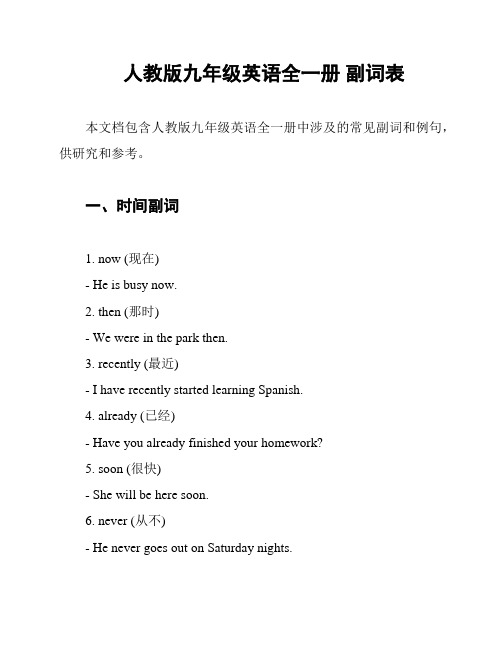
人教版九年级英语全一册副词表本文档包含人教版九年级英语全一册中涉及的常见副词和例句,供研究和参考。
一、时间副词1. now (现在)- He is busy now.2. then (那时)- We were in the park then.3. recently (最近)- I have recently started learning Spanish.4. already (已经)- Have you already finished your homework?5. soon (很快)- She will be here soon.6. never (从不)- He never goes out on Saturday nights.二、地点副词1. here (这里)2. there (那里)- He is not there anymore.3. everywhere (到处)- The flowers are blooming everywhere.4. nowhere (无处)- I can find the book nowhere.5. abroad (国外)- She has been working abroad for two years.三、方式副词1. carefully (仔细地)- He read the instructions carefully.2. quickly (快速地)- She finished the race quickly.3. slowly (慢慢地)- He walked slowly in the park.4. quietly (安静地)- The students were working quietly in the classroom.5. loudly (大声地)- He shouted loudly in excitement.四、频率副词1. always (总是)- She always helps her friends when they need her. 2. often (经常)- He often goes to the gym after work.3. sometimes (有时候)- Sometimes it rains heavily in summer.4. never (从不)- He never drinks coffee before bedtime.5. rarely (很少)- I rarely eat fast food.五、程度副词1. very (非常)- The movie was very interesting.2. quite (相当)- The exam was quite difficult.3. too (太)- It's too cold to go swimming today.4. so (如此)- The pizza was so delicious that I ate too much.5. enough (足够)- She is old enough to start driving.六、疑问副词1. why (为什么)- Why did you quit your job?2. when (什么时候)3. where (在哪里)- Where is the nearest hospital?4. how (如何)- How did you learn to play the piano?5. what (什么)- What is your favorite color?七、连接副词1. however (然而)- He is not very intelligent. However, he is a hard worker.2. therefore (因此)- He didn't study and therefore he failed the test.3. otherwise (否则)- Please turn off the lights, otherwise the battery will die.4. moreover (此外)- She is very smart. Moreover, she is kind-hearted.5. nevertheless (然而)- The weather is bad. Nevertheless, I will go for a walk.以上是人教版九年级英语全一册中常见的副词和例句,希望对大家有所帮助。
(完整word版)英语十大词性及其详细讲解
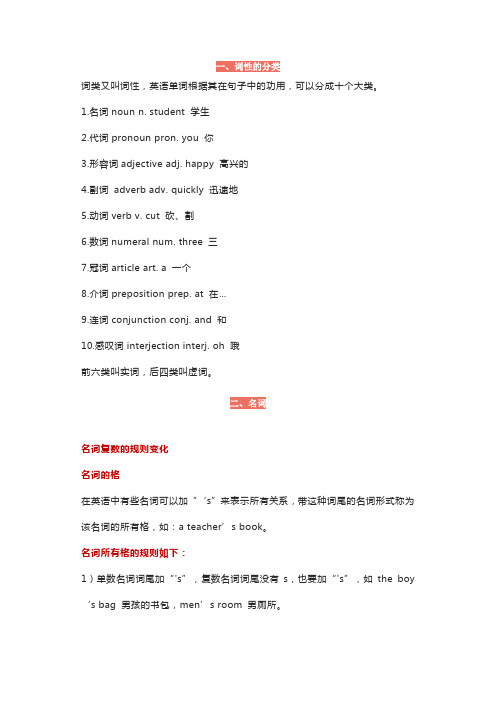
词类又叫词性,英语单词根据其在句子中的功用,可以分成十个大类。
1.名词noun n. student 学生2.代词pronoun pron. you 你3.形容词adjective adj. happy 高兴的4.副词adverb adv. quickly 迅速地5.动词verb v. cut 砍、割6.数词numeral num. three 三7.冠词article art. a 一个8.介词preposition prep. at 在...9.连词conjunction conj. and 和10.感叹词interjection interj. oh 哦前六类叫实词,后四类叫虚词。
名词复数的规则变化名词的格在英语中有些名词可以加“‘s”来表示所有关系,带这种词尾的名词形式称为该名词的所有格,如:a teacher’s book。
名词所有格的规则如下:1)单数名词词尾加“'s”,复数名词词尾没有s,也要加“'s”,如the boy ‘s bag 男孩的书包,men’s room 男厕所。
2)若名词已有复数词尾-s ,只加“'”,如:the workers’struggle工人的斗争。
大多数代词具有名词和形容词的功能。
英语中的代词,按其意义、特征及在句中的作用分为:人称代词、物主代词、指示代词、反身代词、相互代词、疑问代词、关系代词、连接代词和不定代词九种人称代词的用法:I saw her with them,at least,I thought it was her.我看到她和他们在一起,至少我认为是她。
(her做宾语,them做介词宾语,her作主补)a. -- Who broke the vase?--谁打碎了花瓶?b. -- Me.--我。
并列人称代词的排列顺序1) 单数人称代词并列作主语时,其顺序为:第二人称 you第三人称 he/she;it第一人称 I如:You, he and I should return on time.2) 复数人称代词作主语时,其顺序为:第一人称 we第二人称 you第三人称 they反身代词指示代词指示代词分单数(this / that)和复数(these / those)两种形式,既可作限定词又可做代词,疑问代词指人:who,whom,whose指物:what既可指人又可指物:which冠词是位于名词或名词词组之前或之后,在句子里主要是对名词起限定作用的词。
最新英语中副词及用法

副词的定义:副词是一种用来修饰动词,形容词,副词或全句的词,说明时间,地点,程度,方式等概念。
副词的分类:1) 时间和频度副词:now,then,often,always,usually,early,today, lately, next,last,already,generally,frequently, seldom,ever,never,yet,soon,too, immediately, hardly,finally,shortly, before, ago,sometimes, yesterday.2) 地点副词:here, there, everywhere, anywhere, in, out, inside, outside, above, below, down, back, forward, home, upstairs, downstairs, across, along, round , around, near, off, past, up, away, on.3) 方式副词: carefully, properly, anxiously, suddenly, normally, fast, well, calmly, politely, proudly, softly, warmly4) 程度副词: much,little, very,rather,so,too,still, quite, perfectly, enough, extremely, entirely,almost, slightly.5) 疑问副词:how, when, where, why.6) 关系副词:when, where, why.7) 连接副词:how, when, where, why, whether.副词的用法:副词在句中可作状语,表语,短语。
He works hard.他工作努力。
副词及用法
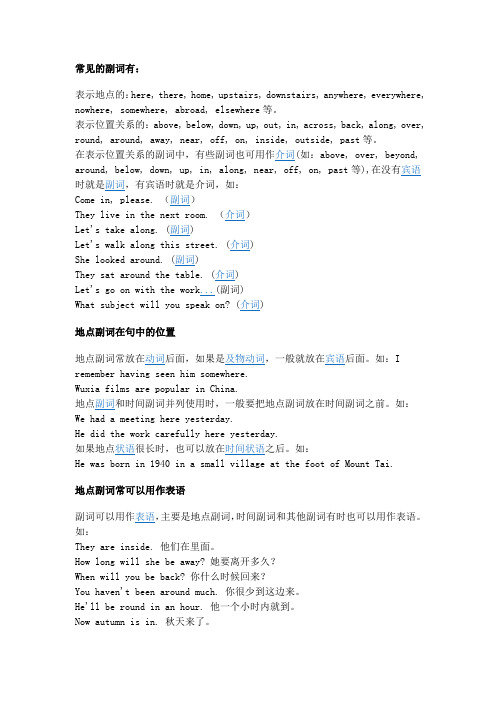
常见的副词有:表示地点的:here, there, home, upstairs, downstairs, anywhere, everywhere, nowhere, somewhere, abroad, elsewhere等。
表示位置关系的:above, below, down, up, out, in, across, back, along, over, round, around, away, near, off, on, inside, outside, past等。
在表示位置关系的副词中,有些副词也可用作介词(如:above, over, beyond, around, below, down, up, in, along, near, off, on, past等),在没有宾语时就是副词,有宾语时就是介词,如:Come in, please. (副词)They live in the next room. (介词)Let's take along. (副词)Let's walk along this street. (介词)She looked around. (副词)They sat around the table. (介词)Let's go on with the work...(副词)What subject will you speak on? (介词)地点副词在句中的位置地点副词常放在动词后面,如果是及物动词,一般就放在宾语后面。
如:I remember having seen him somewhere.Wuxia films are popular in China.地点副词和时间副词并列使用时,一般要把地点副词放在时间副词之前。
如:We had a meeting here yesterday.He did the work carefully here yesterday.如果地点状语很长时,也可以放在时间状语之后。
英语中副词及用法规律总结
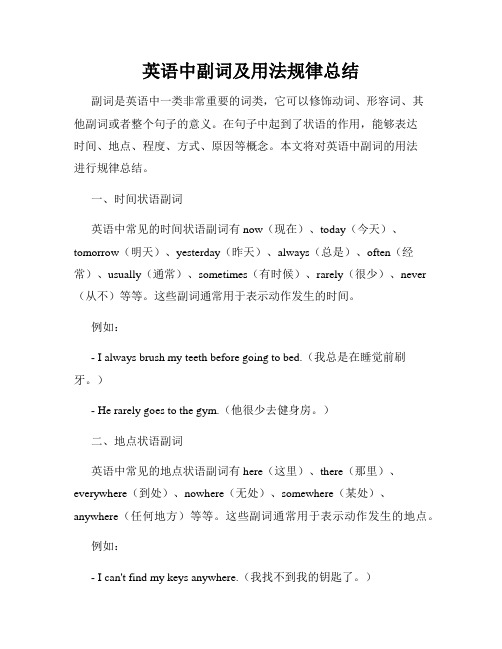
英语中副词及用法规律总结副词是英语中一类非常重要的词类,它可以修饰动词、形容词、其他副词或者整个句子的意义。
在句子中起到了状语的作用,能够表达时间、地点、程度、方式、原因等概念。
本文将对英语中副词的用法进行规律总结。
一、时间状语副词英语中常见的时间状语副词有now(现在)、today(今天)、tomorrow(明天)、yesterday(昨天)、always(总是)、often(经常)、usually(通常)、sometimes(有时候)、rarely(很少)、never (从不)等等。
这些副词通常用于表示动作发生的时间。
例如:- I always brush my teeth before going to bed.(我总是在睡觉前刷牙。
)- He rarely goes to the gym.(他很少去健身房。
)二、地点状语副词英语中常见的地点状语副词有here(这里)、there(那里)、everywhere(到处)、nowhere(无处)、somewhere(某处)、anywhere(任何地方)等等。
这些副词通常用于表示动作发生的地点。
例如:- I can't find my keys anywhere.(我找不到我的钥匙了。
)- There are beautiful flowers everywhere in the garden.(花园里到处都是美丽的花。
)三、方式状语副词英语中常见的方式状语副词有slowly(慢慢地)、quickly(快速地)、carefully(仔细地)、easily(容易地)、quietly(安静地)等等。
这些副词通常用于表示动作进行的方式。
例如:- She speaks English fluently.(她英语说得很流利。
)- The children played happily in the park.(孩子们在公园里开心地玩耍。
)四、程度状语副词英语中常见的程度状语副词有very(非常)、quite(相当)、too (太)、so(如此)、almost(几乎)、only(仅仅)、rather(相当)等等。
(完整word版)几个频率副词的用法知识点及练习题,推荐文档
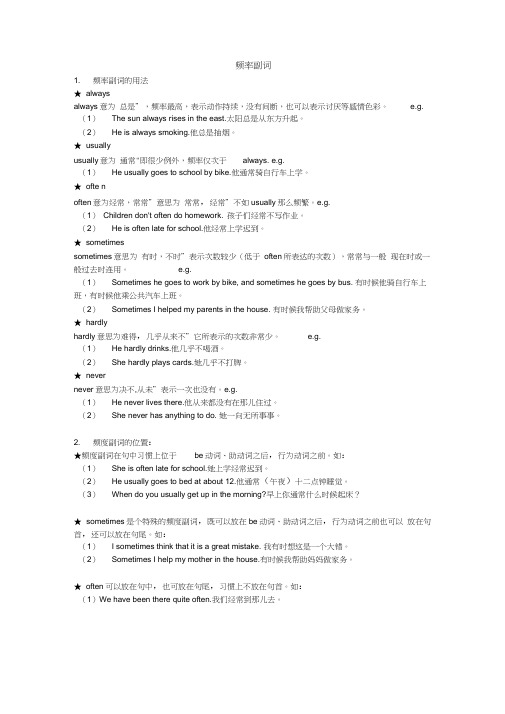
频率副词1. 频率副词的用法★alwaysalways意为总是”,频率最高,表示动作持续,没有间断,也可以表示讨厌等感情色彩。
e.g.(1)The sun always rises in the east.太阳总是从东方升起。
(2)He is always smoking.他总是抽烟。
★usuallyusually意为通常"即很少例外,频率仅次于always. e.g.(1)He usually goes to school by bike.他通常骑自行车上学。
★ofte noften意为经常,常常”意思为常常,经常”不如usually那么频繁。
e.g.(1)Children don't often do homework. 孩子们经常不写作业。
(2)He is often late for school.他经常上学迟到。
★sometimessometimes意思为有时,不时”表示次数较少(低于often所表达的次数),常常与一般现在时或一般过去时连用。
e.g.(1)Sometimes he goes to work by bike, and sometimes he goes by bus. 有时候他骑自行车上班,有时候他乘公共汽车上班。
(2)Sometimes I helped my parents in the house. 有时候我帮助父母做家务。
★hardlyhardly意思为难得,几乎从来不”它所表示的次数非常少。
e.g.(1)He hardly drinks.他几乎不喝酒。
(2)She hardly plays cards.她几乎不打牌。
★nevernever意思为决不,从未”表示一次也没有。
e.g.(1)He never lives there.他从来都没有在那儿住过。
(2)She never has anything to do. 她一向无所事事。
2. 频度副词的位置:★频度副词在句中习惯上位于be动词、助动词之后,行为动词之前。
高考英语总复习副词的种类及用法(10页)
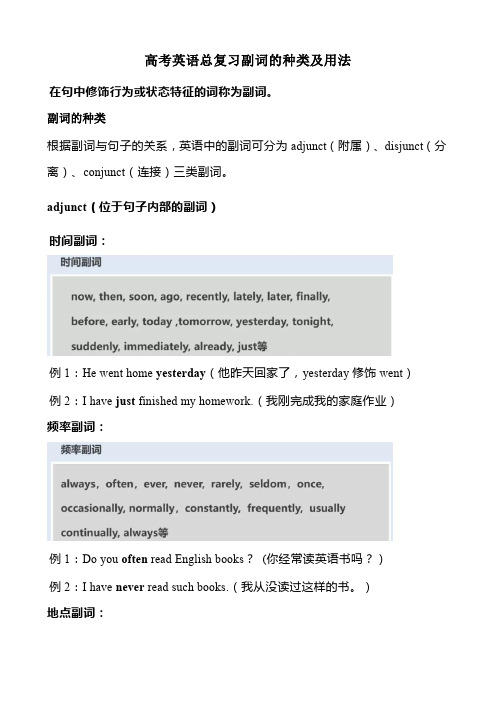
高考英语总复习副词的种类及用法在句中修饰行为或状态特征的词称为副词。
副词的种类根据副词与句子的关系,英语中的副词可分为adjunct(附属)、disjunct(分离)、conjunct(连接)三类副词。
adjunct(位于句子内部的副词)时间副词:例1:He went home yesterday(他昨天回家了,yesterday修饰went)例2:I have just finished my homework.(我刚完成我的家庭作业)频率副词:例1:Do you often read English books?(你经常读英语书吗?)例2:I have never read such books.(我从没读过这样的书。
)地点副词:例1:He will study abroad next year(明年他将在国外学习)例2: He came in(他进来)方式副词:例1:Jack drives very carefully.(杰克开车很小心)例2:She slowly opened the present. (她慢慢地打开礼物)程度副词:例1:I am deeply grateful to you(我由衷地感激你)例2:I quite agree with your opinion(我相当同意你的观点)疑问副词:how,when,where,why例:How often do you see a movie(你多久看一次电影)关系副词:when,where,why例:This is(the place)where he was born.(这是他出生的地方)conjunct(连接两个句子的副词)连接副词:therefore(因此),moreover(此外),however,otherwise(另外的),then,when ,where,how,why……例1:We must be early; otherwise we won't get a seat(我们得早点走,否则我们就没有座位了)例2:Bicycling is good exercise; moreover, it won't pollute the air.(骑自行车是个很好的运动,此外它还不污染环境)disjunct(与句子分离的副词)句子副词(修饰整个句子):actually,certainly,clearly,definitely,evidently(明显地),fortunately,frankly,honestly,possibly,undoubtedly(的确地),unexpectedly(未料到地),finally 等undoubtedly,he is an expert in this field.(毫无疑问,他是这个领域的专家)frankly, you are wrong.(坦白说你错了)副词的位置一般原则:遇有be 动词或助动词时,副词均置于该be动词或助动词之后例1:He is always kind.例2:He can hardly walk(他几乎走不动了)1. 频率副词,置于一般行为动词之前He has never been late. 他从未迟到过。
人教版高中英语选修十一副词表

人教版高中英语选修十一副词表以下是人教版高中英语选修十一课程中常用的副词表:1. 常用的副词
- immediately:立即地
- slowly:慢慢地
- quickly:迅速地
- loudly:大声地
- quietly:安静地
- carefully:小心地
- clearly:清楚地
- simply:简单地
- happily:快乐地
- sadly:悲伤地
2. 时间副词
- soon:不久
- yesterday:昨天
- today:今天
- tomorrow:明天
- always:总是
- never:从不
- sometimes:有时候- often:经常
- rarely:很少
- usually:通常
3. 频率副词
- immediately:立即地- slowly:慢慢地
- quickly:迅速地
- loudly:大声地
- quietly:安静地
- carefully:小心地
- clearly:清楚地
- simply:简单地
- happily:快乐地
- sadly:悲伤地
4. 程度副词
- very:非常
- quite:相当
- extremely:极其
- too:太
- so:如此
- enough:足够
- fairly:相当地
- nearly:几乎
- really:真正地
- absolutely:绝对地
请注意,这只是文档的一小部分,目的是提供人教版高中英语选修十一副词表的一些常见词汇。
(完整word版)英语词性的分类及用法

英语词性的分类及用法一、词性的分类词类又叫词性,英语单词根据其在句子中的功用,可以分成十个大类。
1 名词 noun n. student 学生2 代词 pronoun pron。
you 你3 形容词 adjective adj。
happy 高兴的4 副词 adverb adv. quickly 迅速地5 动词 verb v。
cut 砍、割6 数词 numeral num。
three 三7 冠词 article art。
a 一个8 介词 preposition prep. at 在。
..9 连词 conjunction conj。
and 和10 感叹词 interjection interj. oh 哦前六类叫实词,后四类叫虚词。
二、名词名词概论名词复数的规则变化名词的格在英语中有些名词可以加"’s"来表示所有关系,带这种词尾的名词形式称为该名词的所有格,如:a teacher's book。
名词所有格的规则如下:1)单数名词词尾加"’s”,复数名词词尾没有s,也要加"'s”,如the boy's bag 男孩的书包,men’s r oom 男厕所.2)若名词已有复数词尾—s ,只加”'”,如:the workers’ struggle工人的斗争。
3)凡不能加”'s"的名词,都可以用"名词+of +名词”的结构来表示所有关系,如:the title of the song 歌的名字。
4)在表示店铺或教堂的名字或某人的家时,名词所有格的后面常常不出现它所修饰的名词,如:the barber’s 理发店。
5)如果两个名词并列,并且分别有’s,则表示”分别有”;只有一个’s,则表示'共有'。
如:John's and Mar y’s room(两间)John and Mary's room(一间)6) 复合名词或短语,’s 加在最后一个词的词尾。
(完整word版)七年级英语频度副词
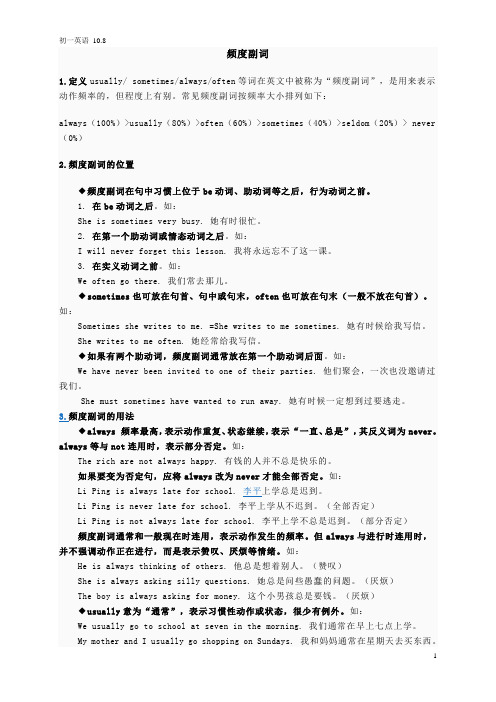
频度副词1.定义usually/ sometimes/always/often等词在英文中被称为“频度副词”,是用来表示动作频率的,但程度上有别。
常见频度副词按频率大小排列如下:always(100%)>usually(80%)>often(60%)>sometimes(40%)>seldom(20%)> never (0%)2.频度副词的位置◆频度副词在句中习惯上位于be动词、助动词等之后,行为动词之前。
1. 在be动词之后。
如:She is sometimes very busy. 她有时很忙。
2. 在第一个助动词或情态动词之后。
如:I will never forget this lesson. 我将永远忘不了这一课。
3. 在实义动词之前。
如:We often go there. 我们常去那儿。
◆sometimes也可放在句首、句中或句末,often也可放在句末(一般不放在句首)。
如:Sometimes she writes to me. =She writes to me sometimes. 她有时候给我写信。
She writes to me often. 她经常给我写信。
◆如果有两个助动词,频度副词通常放在第一个助动词后面。
如:We have never been invited to one of their parties. 他们聚会,一次也没邀请过我们。
She must sometimes have wanted to run away. 她有时候一定想到过要逃走。
3.频度副词的用法◆always 频率最高,表示动作重复、状态继续,表示“一直、总是”,其反义词为never。
always等与not连用时,表示部分否定。
如:The rich are not always happy. 有钱的人并不总是快乐的。
如果要变为否定句,应将always改为never才能全部否定。
根据最新英语人教版七年级上册副词固定搭配归纳

根据最新英语人教版七年级上册副词固定搭配归纳根据最新英语人教版七年级上册的内容,以下是对副词固定搭配的归纳:1. Always:- 表示持续或频繁的动作,通常用于一般现在时- 例句:I always wake up early in the morning.2. Usually:- 表示通常、经常,用于一般现在时- 例句:I usually go to bed early.3. Often:- 表示经常,用于一般现在时- 例句:He often plays basketball after school.4. Sometimes:- 表示有时候,用于一般现在时- 例句:We sometimes have picnics on the weekends.5. Never:- 表示从不,用于一般现在时- 例句:She never eats fast food.6. Hardly ever:- 表示很少,用于一般现在时- 例句:They hardly ever watch movies.7. Once a week/month:- 表示每周/每月一次- 例句:I go swimming once a week.8. Twice a day/week/month:- 表示每天/每周/每月两次- 例句:They have English class twice a week.9. Every day/week/month/year:- 表示每天/每周/每月/每年- 例句:We go jogging every morning.10. In the morning/afternoon/evening/night:- 表示在早上/下午/晚上/夜晚- 例句:I study English in the evening.以上是根据最新英语人教版七年级上册的内容对副词固定搭配的归纳。
希望对您有所帮助。
- 1、下载文档前请自行甄别文档内容的完整性,平台不提供额外的编辑、内容补充、找答案等附加服务。
- 2、"仅部分预览"的文档,不可在线预览部分如存在完整性等问题,可反馈申请退款(可完整预览的文档不适用该条件!)。
- 3、如文档侵犯您的权益,请联系客服反馈,我们会尽快为您处理(人工客服工作时间:9:00-18:30)。
副词的定义:
副词是一种用来修饰动词,形容词,副词或全句的词,说明时间,地点,程度,方式等概念。
副词的分类:
1) 时间和频度副词:
now,then,often,always,usually,early,today, lately, next,last,already,generally,frequently, seldom,ever,never,yet,soon,too, immediately, hardly,finally,shortly, before, ago,sometimes, yesterday.
2) 地点副词:
here, there, everywhere, anywhere, in, out, inside, outside, above, below, down, back, forward, home, upstairs, downstairs, across, along, round , around, near, off, past, up, away, on.
3) 方式副词: carefully, properly, anxiously, suddenly, normally, fast, well, calmly, politely, proudly, softly, warmly
4) 程度副词: much,little, very,rather,so,too,still, quite, perfectly, enough, extremely, entirely,almost, slightly.
5) 疑问副词:
how, when, where, why.
6) 关系副词:
when, where, why.
7) 连接副词:
how, when, where, why, whether.
副词的用法:
副词在句中可作状语,表语,短语。
He works hard.
他工作努力。
You speak English quite well.
你英语讲的很好。
Is she in ?
她在家吗?
Let's be out.
让我们出去吧。
Food here is hard to get.
这儿很难弄到食物。
副词的位置:
1) 多数副词都可以放在动词的后面,如果动词带有宾语,副词就放在宾语后面。
I get up early in the morning everyday.
我每天早早起床。
He gave me a gift yesterday.
他昨天给了我一件礼物。
She didn't drink water enough.
她没喝够水。
The train goes fast.
火车跑得快。
We can go to this school freely.
我们可以免费到这家学校学习。
They left a life hardly then.
当时他们的生活很艰难。
He has a new cat on today.
他今天戴了一顶新帽子。
I have seen this film twice with my friends.
这部电影我和朋友看过两次。
2) 副词修饰形容词,副词时,副词在前面,而被修饰的词在后面。
It's rather easy, I can do it.
这很容易,我能做到。
He did it quite well.
他做得相当好。
It's rather difficult to tell who is right.
很难说谁是对的。
It's so important that I must tell my friends.
这件事太重要了,我得告诉我的朋友。
It's much better.
好多了。
3) 频度副词可放在实义动词的前面,情态动词和助动词的后面。
I often help him these days.
这些日子我经常帮助他。
I always remember the day when I first came
to this school.
我常常记得我第一次来学校的那一天。
You mustn't always help me.
你不能老是帮助我。
He seldom comes to see us.
他很少来看我们。
We usually go shopping once a week.
我们通常一周买一次东西。
The new students don't always go to dance.
新学生并不时常去跳舞。
4) 疑问副词,连接副词,关系副词以及修饰整个句子的副词,通常放在句子或从句的前面。
When do you study everyday?
你每天什么时间学习?
Can you tell me how you did it?
你能告诉我你如何做的吗?
First, let me ask you some questions.
先让我来问几个问题。
How much does this bike cost?
这辆车子多少钱?
Either you go or he comes.
不是你去就是他来。
The students were reading when the teacher came into the classroom.
当老师进教室时,学生们正在读书。
5) 时间副词和地点副词在一个句中, 地点副词在前面时间副词在后面。
We went shopping in the supermarket at 9 o'clock yesterday.
昨天九点钟我们到超市买东西了.
What were you doing in the classroom yesterday evening?
昨天下午你在教室里干什么?
The accident took place one hour ago in the Eleven Avenue.
一小时前十一号大街发生了一场事故。
副词的比较等级:
副词和形容词一样,也有它的比较级和最高级形式. 可以参考形容词的变换形式。
但以词尾-ly 结尾的副词(除early )须用more 和most 。
hard harder hardest
fast faster fastest
early earlier earliest
much more most
warmly more warmly most warmly
单音节副词的比较级是在副词后面加上-er 构成的,最高级是在副词后面加上-est 构成的。
near nearer nearest
hard harder hardest
多音节副词的比较级是在副词的前面加上-more 构成的。
最高级是在副词前面加上-most 构成的。
warmly more warmly most warmly
successfully more successfully most successfully
有些副词的比较级和最高级形式是不规则的。
well-better - best little - less - least
Much- more - most badly - worse - worst
far-farther(further)-farthest(furthest)
副词的比较级和最高级用法同形容词的比较级用法基本一样。
最高级形式句中the 可以省略。
He works harder than I.
他比我工作努力。
Lucy gets up earlier than Lili.
露西比丽丽起床早。
He runs fastest in our class.
他在我们班跑地最快。
He dives deeper than his teammates.
他比他的队员潜水深。
It's true that he speak English more fluently than any of us. 他英语讲的确实比我们任何人都好。
Our school team play football best in our region.
我们校队在我们地区足球踢得最好的。
